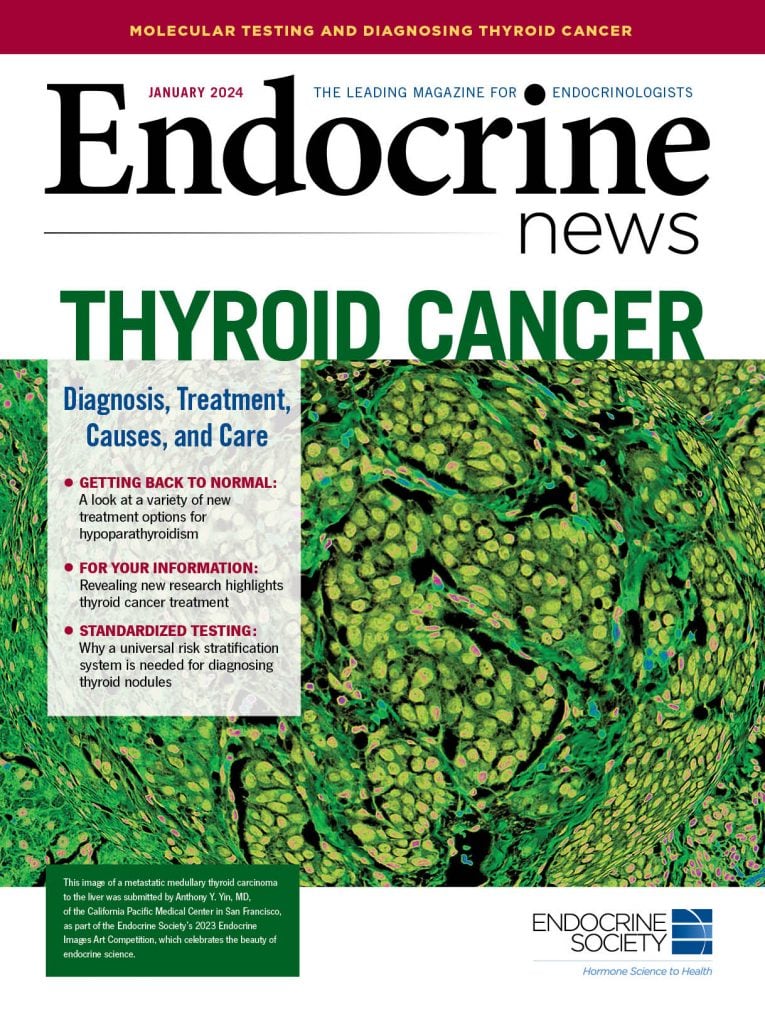
As we start the year, we are devoting the lion’s share of the editorial pages this month to thyroid cancer. From its diagnosis and treatment to detailed studies about hypoparathyroidism, risk stratification for thyroid nodules, and more. With thyroid cancer being the most common endocrine cancer in the world, we thought it would be appropriate to devote this issue to its treatment and research.
In “Getting Back to Normal: Options for Treating Hypoparathyroidism,” senior editor Derek Bagley talks to Aliya Khan, MD, about the debilitating effects of hypoparathyroidism, as well as some new treatment guidelines she helped create. She also discusses exciting news from trials that showed promising results that could actually lead to a much-improved quality of life for these patients, both physical and psychological. Khan details one patient in particular who found relief from his hypoparathyroidism after participating in a clinical trial of a prodrug that replaced parathyroid hormone. This patient’s symptoms were so severe that not only did he have recurrent kidney stones throughout his life, but he also experienced seizures that limited his activities. “If you’re having seizures and you don’t know when you could have a seizure, that affects your ability to swim or do sports activities that other people take for granted because they know they’re not going to have a seizure,” she says, adding that he could have a seizure while he was swimming and potentially drown.

New research from the world of thyroid cancer is featured in “For Your Information: Recent Revelations on Thyroid Cancer Treatment,” by Kelly Horvath. And, as is often the case, we are highlighting research from two Endocrine Society journals as well as a presentation from ENDO 2023 in Chicago! Kelly has included a mesmerizing study from Endocrine Reviews on radiation-induced thyroid cancer; a JCEM Case Reports paper on false-positive results in metastatic thyroid cancer; and a presentation from ENDO 2023 that looks at thyroid cancer survival. According to Megan Haymart, MD, the Nancy Wigginton Endocrinology Research Professor in Thyroid Cancer and a professor of medicine at the University of Michigan in Ann Arbor, we are now in an era of more personalized and tailored management of thyroid cancer. “However, there are both advantages and disadvantages to less-intensive treatment,” she says. “For example, although surgical risks are greater with more intensive treatment, the long-term follow-up is more difficult in patients who received less-intensive surgical or medical management (e.g., less use of radioactive iodine).”
Originally when we envisioned the Early-Career Corner department that launched last year, we thought it would be quarterly, if that often. Turns out, it has been monthly because the Endocrine Society’s early-career members are busy! Derek speaks with Priyanka Majety, MD, in “Standardized Testing: Universal Risk Stratification System Needed for Thyroid Nodules,” who discusses why clinicians — not just endocrinologists, but general practitioners and other specialties as well — need to coalesce around a single set of standards for evaluating thyroid nodules. She says that in many cases, thyroid cancer patients often get different, and even conflicting, treatment recommendations from various diagnostic tools. One set of standards could bring that to an end.
The unpredictable nature of tumor behavior is the subject of this month’s Practice Resources column by Kelly Horvath. In “Molecular Testing and the Future of Diagnosing Thyroid Cancer,” Joshua Klopper, MD, the medical director for Endocrinology at diagnostics company Veracyte, discusses a new tool that could help physicians make treatment decisions by using molecular signatures to home in on how the tumor could react. Klopper refers to three separate posters on the new tool that were presented in September at the annual American Thyroid Association Annual Meeting in Washington, D.C.
Feel free to let us know what you think of this thyroid cancer issue. This theme essentially evolved from the topic being both timely as well as yielding various stories all interconnected one way or the other. As usual, if you have any other questions, comments, or ideas, let me know at: [email protected].

